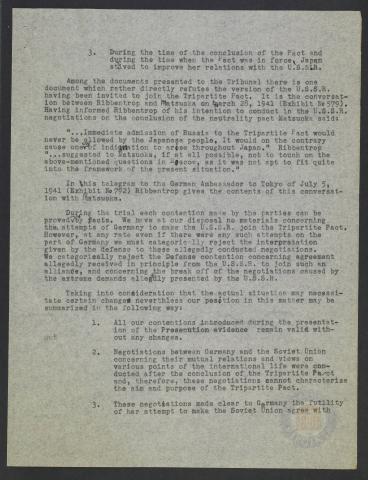
Page 17
| Parent | Transferring materials concerning The Tripartite Pact and The Anti-Comintern Pact |
|---|---|
| Date | 19 September 1947 |
| Language | English |
| Collection | Tavenner Papers & IMTFE Official Records |
| Box | Box 5 |
| Folder | General Memoranda and Reports from September 1947 |
| Repository | University of Virginia Law Library |
3. During the time of the conclusion of the Pact and during the time when the Pact was in force, Japan strived to improve her relations with the U.S.S.R. 4. Among the documents presented to the Tribunal there is on document which rather directly refutes the version of the U.S.S.R. having been invited to join the Tripartite Pact. It is the conversation between Ribbentrop and Matsuoka on March 28, 1941 (Exhibit No 579). Having informed Ribbentrop of his intention to conduct in the U.S.S.R. negotiations on the conclusion of the neutrality pact Matsuoka said: ?Ç£. . . Immediate admission of Russia to the Tripartite Pact would never be allowed by the Japanese people. It would on the contrary cause one cry of indignation to arise throughout Japan.?Ç¥ Ribbentrop ?Ç£. . . suggested to Matsuoka, if at all possible, not to touch on the above-mentioned questions in Moscow, as it was not apt to fit quite into the framework of the present situation.?Ç¥ In his telegram to German Ambassador to Tokyo of July 5, 1941 (exhibit No 792) Ribbentrop gives the contents of this conversation with Matsuoka. During the trial each contention made by the parties can be proved only by facts. We have at out disposal no materials concerning the attempts of Germany to make the U.S.S.R. join the Tripartite Pact. However, at any rate even if there were any such attempts on the part of Germany we must categorically reject the interpretation given by the defense to these allegedly conducted negotiations. We categorically reject the Defense contention concerning agreement allegedly received in principle from the U.S.S.R. to join such an alliance, and concerning the break off of the negotiations caused by the extreme demands allegedly presented by the U.S.S.R. Taking into consideration that the actual situation may necessitate certain change nevertheless our position in this matter may be summarized in the following way: 1. All our contentions introduced during the presentation of the Prosecution evidence remain valid without any changes. 2. Negotiations between Germany and the Soviet Union concerning their mutual relations and views on various points of the international life were conducted after the conclusion to the Tripartite Pact and, therefore, these negotiations cannot characterize the aim and purpose of the Tripartite Pact. 3. These negotiations made clear to Germany the futility of their attempt to make the Soviet Union agree with
